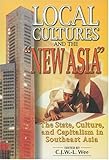Local Cultures and the New Asia : The State, Culture, and Capitalism in Southeast Asia / ed. by C.J.W.-L. Wee.
Material type: TextPublisher: Singapore : ISEAS Publishing, [2002]Copyright date: ©2002Description: 1 online resource (260 p.)Content type:
TextPublisher: Singapore : ISEAS Publishing, [2002]Copyright date: ©2002Description: 1 online resource (260 p.)Content type: - 9789812301239
- 9789812307149
- HC441 .L63 2002
- online - DeGruyter
| Item type | Current library | Call number | URL | Status | Notes | Barcode | |
|---|---|---|---|---|---|---|---|
 eBook
eBook
|
Biblioteca "Angelicum" Pont. Univ. S.Tommaso d'Aquino Nuvola online | online - DeGruyter (Browse shelf(Opens below)) | Online access | Not for loan (Accesso limitato) | Accesso per gli utenti autorizzati / Access for authorized users | (dgr)9789812307149 |
Frontmatter -- CONTENTS -- Acknowledgements -- Contributors -- Introduction: Local Cultures, Economic Development, and Southeast Asia -- SECTION I: THE STATE -- 1. Development Enabler or Disabler? The Role of the State in Southeast Asia -- 2. Muddling Through: Development under a “Weak” State -- SECTION II: THE CULTURAL LINEAGES OF “ASIAN” CAPITALISM -- 3. Battering Down the Chinese Walls: The Antinomies of Anglo-American Liberalism and the History of East Asian Capitalism in the Shadow of the Cold War -- 4. Religion, Values, and Capitalism in Asia -- SECTION III: THE STATE AND LOCAL CULTURES -- 5. From Universal to Local Culture: The State, Ethnic Identity, and Capitalism in Singapore -- 6. Telephony at the Limits of State Control: “Discourse Networks” in Indonesia -- 7. Rethinking Modernity: State, Ethnicity, and Class in the Forging of a Modern Urban Malaysia -- 8. Thai Middle-Class Practice and Consumption of Traditional Dance: “Thai-ness” and High Art -- Index
restricted access online access with authorization star
http://purl.org/coar/access_right/c_16ec
Southeast Asia, until the Asian economic crisis of 1997-2000, was a high economic growth area. However, despite the neo-liberal and globalizing logic of capitalism, local conditions and cultures determine that capitalism will spread in ways not entirely consonant with its Western origins. Capitalism is not a free-floating entity -- it is a socially embodied phenomenon that needs to function in various cultural contexts. Consequently, the tension between the universal status that some claim capitalism now occupies in the post–Cold War world and the particularities of the local cultures it enters should be of great concern.
Mode of access: Internet via World Wide Web.
In English.
Description based on online resource; title from PDF title page (publisher's Web site, viewed 01. Dez 2022)


